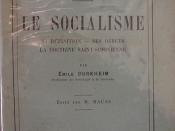In the UK, the National Lottery can result in an individual winning millions of pounds. But the question is whether it can also encourage someone to commit suicide or at least make them consider taking our own lives. However there are various sociological variables and factors that must be taken into account such as the socio-economic background or the stability of the individual before answering whether or not the lottery promotes suicidal tendencies. Theoretical and sociological theories and evidence will be analysed and used to support arguments for and against this question. In particular, the research and theories formulated and conducted by Emile Durkheim will play an integral role in answering this question.
Emile Durkheim was a renowned social scientist who made an indepth study into the nature of suicide and even wrote a book on it in 1951 titled, 'Suicide: A Study in Sociology'. He theorised and stated that "Every Break in equilibrium...gives
boost to voluntary death" (Suicide p271). "The causal factor is identified therefore not as the material circumstances themselves, but due to the social instability they create" (www.academicdb.com). The statement suggests that it is not necessarily the materialistic effect the lottery has but the drastic impact it has on the social environment as a result of the radical change it has made on the individual's life that leads to suicide. Therefore sudden increases in wealth, such as winning the National Lottery, can lead to "social declassification". For instance, a National Lottery winner would most likely relocate into a larger house in a different area and therefore surround themselves with brand new people, a new atmosphere and surroundings. Everything changes and this can result in 'Anomic Suicide'.
Durkheim came up with the theory of 'Anomic Suicide'. The word anomy comes from the Greek...



The lottery and suicide
I initially thought that this was a rather unusual thesis for a paper. However, while reading it I could actually see the logic in your study. This is some very interesting and unique stuff. Good work! I couldn't have done it better.
1 out of 1 people found this comment useful.